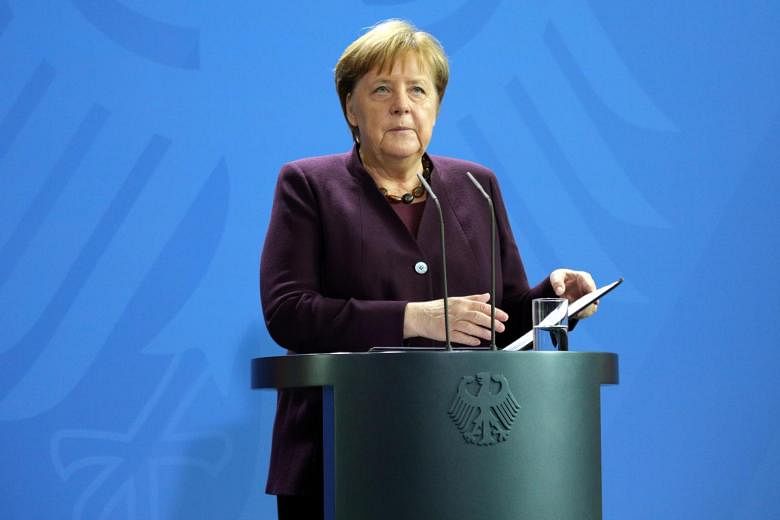FRANKFURT (BLOOMBERG) - Chancellor Angela Merkel vowed decisive action to combat racism after 11 people were killed in shootings on Wednesday night (Feb 20) in a town near Frankfurt in what she said appeared to be a right-wing extremist attack by a lone gunman.
The news prompted immediate soul-searching in a nation gripped by concerns about the rise of the far right, which is upending the traditional political order in Europe's biggest economy and disrupting the final stages of Dr Merkel's four-term chancellorship.
If the Hanau shooter's motive is confirmed, it would be the third prominent assault by the extreme right in less than a year after a synagogue attack in eastern Germany in October and the murder of a regional lawmaker from Dr Merkel's party last June.
"We will work against those who try to divide us in Germany with all possible strength and decisiveness," a grim-faced Dr Merkel said in a brief statement in Berlin. "Racism is poison, hate is poison, and this poison exists in our society, and is at fault for far too many crimes."
Nine were killed at two different bars in Hanau, before the suspected perpetrator and his mother were found dead at a nearby home. The suspect was a 43-year-old German national from Hanau, according to Mr Peter Beuth, interior minister in the regional Hesse government. Bild newspaper identified him as Tobias R.
The federal prosecutor has taken over the case and is treating it as a suspected terror attack, Mr Beuth said.
"A first analysis of the suspected culprit's home page points to a xenophobic motive," he said in a statement to the Hesse Parliament. "I condemn this act in the strongest possible terms. It is an attack on our free and peaceful society."
Some of the victims were of Kurdish origin, Bild said, without naming the source of its information. Mr Beuth said the suspect was not previously known to the authorities and had apparently acted alone.
"At the moment, there is much to indicate that the assailant acted based on right-wing extremist, racist motives, out of hate for people of different descent, different faiths and different appearances," Dr Merkel said.
The initial shots were fired at the Midnight shisha bar at the Heumarkt in the town centre at around 10pm local time, local media reported. After entering the bar's smoking area, the shooter fired wildly at guests, killing five.
CHAMPIONS LEAGUE
Many people were out watching the Champions League football match between German club RB Leipzig and English rivals Tottenham Hotspur, a local bar owner told Bloomberg.
The next incident was around 2km away at the Arena Bar & Cafe in the Kesselstadt neighbourhood. The corpses of the suspected shooter and his mother were later found in a nearby apartment after police tracked his car.
The attack comes at an extremely delicate juncture in German politics, with Dr Merkel's grip on power weakened ahead of her retirement by September 2021 at the latest. She took an accepting stance on refugees at the height of the Syria crisis that has come at a price.
For the last two weeks, the country has been in crisis after her party aligned with the far-right Alternative for Germany in a vote for premier in an eastern German state. The fallout from that led to the resignation of Dr Merkel's heir apparent from her post as party leader and a chaotic process to replace her.
Germany has relatively strict gun controls, but has suffered shooting attacks by lone gunmen before. In March 2009, a 17-year-old school pupil in the southern town of Winnenden shot dead 15 people before killing himself during a gunfight with police.
In 2016, a teenager went on the rampage in Munich, shooting dead nine people at a shopping mall before turning the gun on himself after a siege lasting several hours.
In October last year, a heavily armed man attempted to storm a synagogue in Halle on the Yom Kippur holiday and killed two people nearby in a suspected anti-Semitic attack that authorities blamed on the far right.
Hanau is also close to where Walter Luebcke, a Hesse lawmaker from Dr Merkel's CDU who supported her refugee policy, was gunned down last year.
Latest interior ministry figures show that there were almost 13,000 violent right-wing extremists in Germany in 2018.
Known as the birthplace of the Brothers Grimm, Hanau is about 20km east of Frankfurt, Germany's financial centre, and has around 100,000 inhabitants from diverse ethnic backgrounds.
In the 2017 general election, the AfD scored 14 per cent, making it the third-strongest party after Dr Merkel's CDU and the Social Democrats.
The area is a melting pot of Kurds, Turks and Germans but doesn't typically have a problem with far-right extremism, said Mr Youssef H., a Turkish immigrant who has lived in Hanau for 50 years. He declined to give his full surname. "Everyone is shocked," he told Bloomberg. "I can't believe this happened here. It's surreal."

